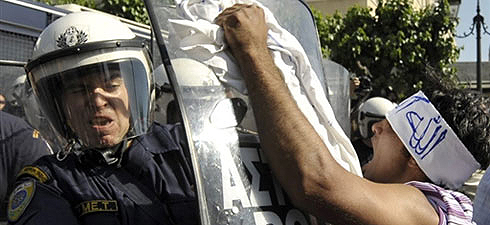Police across the country are now on alert, fearing civil unrest on the scale of the riots which occurred in Greece in December 2008 or the Paris ghettoes in 2005. Experts have reported that Muslim immigrants are unable to control their anger at what they have termed “police racism.” There have been several demonstrations in the capital, and a number of extremist groups have taken advantage of the situation “to pour petrol on the flames.” The worst of these incidents occurred on 23 May, when arsonists attacked a basement that serves as a makeshift mosque in the centre of Athens. No one has claimed responsibility, but members of an extreme-right group were seen in the area of the building shortly before the fire broke out.
During the demonstrations, immigrants chanted “Allah, Allah” and denounced police methods. The protests were sparked by reports of a police officer throwing a Koran onto the ground and stamping on it, in the course of an identity check. An inquiry is underway, but may prove to be inconclusive due to a shortage of neutral witnesses. Ahead of demonstrations planned for the weekend, the Minister of the Interior has convened several crisis meetings, and asked police to remain on alert across the country. Greece’s Muslim population is not confined to Athens, and there are fears that the flare up may extend to Turkish, Pomak and Roma Muslim communities, which for centuries, have lived alongside orthodox Greeks in Thrace, in the north of the country. But for now, the violence appears to be concentrated in Athens where, only a few days ago, a Muslim attempted fire shots at a police station in a suburb of the city. The man was arrested in time, but his action immediately triggered the setting up of a series of identity checkpoints targeting immigrants, with plain clothes and uniformed police searching cars.
Resentment at this type of police action is exacerbated by the fact that there are currently no Muslims in the Greek police force. However, in recent months, the Ministry has set up advisory groups with a view to establishing a recruitment programme for Muslim police and to improve its response in the event of an emergency. However, these initiatives will be hard pressed to compensate for the lack of collaboration with the Muslim community, which is highly critical of the Greek state’s failure to keep its promises. Over the last thirty years, successive governments have failed to honour a commitment to establish a mosque in Athens. In the last decade, with the arrival of large numbers of illegal immigrants, the Muslim population has grown rapidly, and now more than 700,000 people have to contend with the chronic lack of facilities in which to practice their religion. Over a hundred illegal, makeshift prayer halls have been set up in basements and garages, located between Omonia Square and the poor neighbourhoods, between the capital and Piraeus. These are not mosques, but the plans to build a place of worship in Athens have been in existence for years.
As early as 1978, the king of Saudi Arabia, Khaled, obtained a commitment from the prime minister of the period, Constantin Caramanlis, to build a mosque in the northern suburbs of Athens. In the year 2000, in the run-up to the Olympic games, the prospect of the arrival of a large contingent of Muslim athletes in four years time resulted in a plan to build a Muslim centre and a mosque at Peania, close to Athens airport. However, the project was shelved, when the Greek Orthodox church, which has a special status in the Greek state, submitted a formal objection. The story was repeated in 2006, when the neighbourhood of Eleona, close to the centre of Athens was chosen, and once again the plan was set aside. Muslims also have to cope with the lack of a proper cemetery in Athens, and many of them pay thousands of euros to bury their dead in Thrace or in their country of origin. Foreign analysts have criticized Greece, a Christian Orthodox country, for its failure to take proper care of Muslim immigrants. Clearly, the problem of Muslim resentment is deep-rooted one, and the recent violent clashes with police are simply the tip of the iceberg.
IMMIGRATION
Muslims subject to discrimination in Europe
Muslims subject to discrimination in Europe
An inquiry conducted by the European Agency of Fundamental Rights reports that a majority of Muslims resident in the Union are often subject to discrimination. According to Spanish daily La Vanguardia, “one out three immigrants is subject to discrimination and one out of ten is the victim of a racist attack.” Their religious belief is also an obstacle to finding work or accommodation. Because of political conflicts in their host countries, their situation has deteriorated in recent years. Muslims no longer trust the authorities enough to report unfair treatment. “Insulted and demoralised, eight out of ten no longer seek help,” the agency reports.
Was this article useful? If so we are delighted!
It is freely available because we believe that the right to free and independent information is essential for democracy. But this right is not guaranteed forever, and independence comes at a cost. We need your support in order to continue publishing independent, multilingual news for all Europeans.
Discover our subscription offers and their exclusive benefits and become a member of our community now!












